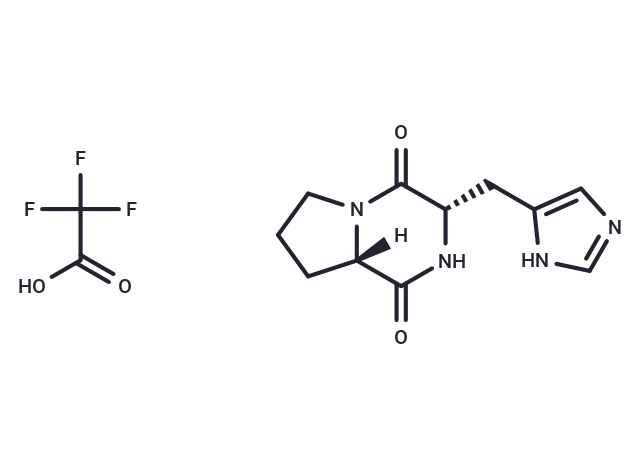Shopping Cart
- Remove All
 Your shopping cart is currently empty
Your shopping cart is currently empty

Cyclo(his-pro) TFA, an orally active cyclic dipeptide structurally related to tyreotropin-releasing hormone, has shown inhibitory effects on NF-κB nuclear accumulation. Additionally, it possesses the ability to cross the blood-brain barrier and impact various inflammatory and stress responses [1, 2].


| Description | Cyclo(his-pro) TFA, an orally active cyclic dipeptide structurally related to tyreotropin-releasing hormone, has shown inhibitory effects on NF-κB nuclear accumulation. Additionally, it possesses the ability to cross the blood-brain barrier and impact various inflammatory and stress responses [1, 2]. |
| In vitro | Cyclo(histidyl-proline) TFA (Cyclo(his-pro) TFA; 50 μM; 1-48 hours) enhances the nuclear presence of Nrf2 and blocks the nuclear entry of NF-κB, effectively inhibiting its translocation. On its own, Cyclo(His-Pro) does not affect the nuclear translocation of these transcription factors. When administered at 50 μM prior to exposure to paraquat (PQ) for 48 hours, Cyclo(his-pro) TFA prevents protein nitration induced by PQ and mitigates its adverse effects, notably reducing cell apoptosis as evidenced by decreased caspase 3 activity and cytochrome c release. Furthermore, it counters NF-κB nuclear accumulation in rat pheochromocytoma PC12 cells exposed to paraquat by activating the Nrf2/heme oxygenase-1 pathway. Western Blot Analysis on PC12 cells treated with 50 μM of the compound for durations ranging from 1 to 48 hours corroborates these findings, showing increased Nrf2 nuclear levels and diminished NF-κB nuclear translocation. |
| In vivo | Cyclo(histidyl-proline) TFA (Cyclo(his-pro) TFA; 1.8 mg/ear), when topically applied to the right ear of male C57BL/6 mice (25-30 g) 30 minutes before TPA treatment, significantly reduces TPA-induced ear edema, demonstrating its anti-inflammatory properties. Additionally, Cyclo(his-pro) TFA displays in vivo anti-inflammatory effects within the central nervous system by decreasing hepatic and cerebral TNFα levels, which helps to mitigate LPS-induced gliosis. Furthermore, this compound enhances ER stress sensitivity and initiates the unfolded protein response by up-regulating Bip, thereby alleviating ER stress. This dual mechanism of action confirms Cyclo(his-pro) TFA as an effective agent against inflammation [2,3]. |
| Molecular Weight | 348.282 |
| Formula | C13H15F3N4O4 |
| Cas No. | 936749-56-3 |
| Storage | Powder: -20°C for 3 years | In solvent: -80°C for 1 year | Shipping with blue ice. |

Copyright © 2015-2025 TargetMol Chemicals Inc. All Rights Reserved.